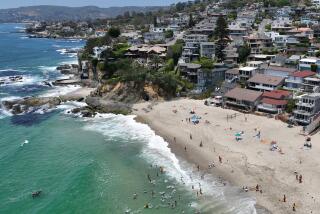Key Official Backs Firing of Coastal Panelâs Director
A top Wilson administration official, saying there is âa crisis of confidenceâ at the California Coastal Commission, on Wednesday expressed his support for firing the powerful agencyâs longtime executive director at a special meeting next week.
State Resources Secretary Douglas Wheeler said that he communicated through associates his desire to see Coastal Commission chief Peter Douglas step down after attending a marathon meeting in January where the Bolsa Chica development project won commission approval despite Douglasâ concerns.
Wheeler confirmed that his former deputy, Carol Whiteside, is a candidate to replace Douglas as executive director of the agency charged with protecting the stateâs 1,100-mile coastline. Whiteside, the former mayor of Modesto, is the governorâs director of intergovernmental relations.
In an unprecedented move, Acting Commission Chairman Louis Calcagno on Monday called a special meeting of the commission for July 12 in Huntington Beach to consider the continued employment of Douglas and initiation of a search for a replacement, if necessary. The move comes less than a month after a new Republican majority took control of the commission for the first time in the agencyâs history. Douglas and Republicans and some Democrats on the commission have long clashed over development.
Calcagno said he called the session because it is necessary âto clear the airâ about the future of Douglas and the direction of the commission. Neither he nor other Republican commissioners have indicated what action they will take.
Wheeler said he particularly objected to Douglasâ refusal to support the Koll Real Estate Groupâs planned 3,300-home Bolsa Chica project near Huntington Beach that was endorsed by the Orange County Board of Supervisors. âIt was certainly persuasive to see firsthand that the staff was prepared to ignore a pretty clear consensus on the issue,â Wheeler said.
The resources secretary said Douglas âhad not responded to the concerns of the owner of the property and Orange Countyâ about moving forward with the long-stalled development next to one of the last remaining undeveloped wetlands in Southern California.
The commission staff, led by Douglas, had recommended eliminating 900 of the homes that would be built in the wetlands. The remaining 2,400 homes would be built on a nearby coastal mesa.
Douglas said Wednesday that building the homes âin the wetlands was not consistent with the Coastal Act,â the stateâs coastal protection law. âIt would have been highly inappropriate of the staff to base its decision on who is for and who is against a particular project,â Douglas said.
After a 12-hour hearing punctuated by cross-fire between supporters and opponents, the commission voted 8 to 3 to overturn the staffâs recommendation and approve the project, including the homes in the wetlands.
âIt is an interesting position to put me in,â Douglas said in response to Wheelerâs remarks. âItâs not our job to decide how the Coastal Act applies to . . . a project based on agreements reached between the property owner and the county. The law has certain standards that have to be met.â
But it was not the Bolsa Chica decision alone that prompted Wheeler to oppose Douglas remaining in the job he has held for 11 years. Also playing a role was the executive directorâs refusal in November to allow Southern California Edison to scale back an expensive program required to offset damage to the marine environment caused by the cooling-water intake and hot-water discharge from the San Onofre nuclear power plant.
Douglas adamantly refused to approve a scaled-back mitigation plan, writing that âa deal is a deal and all parties should be held to their commitments.â The Edison effort failed when the commission deadlocked 6 to 6 on whether to back Douglasâ stance.
Scientific studies have shown that the nuclear plant in northern San Diego County has been damaging offshore kelp beds and that its cooling system has been sucking in and killing millions of fish and larvae each year. The mitigation plan calls for Edison to compensate by building a 300-acre artificial reef, restoring the San Dieguito wetlands and contributing to construction of a fish hatchery. Wheeler said he called Douglas on the San Onofre issue and âfound him completely unwilling to discuss the possibility of a revisionâ to the mitigation plan.
More to Read
Get the L.A. Times Politics newsletter
Deeply reported insights into legislation, politics and policy from Sacramento, Washington and beyond. In your inbox three times per week.
You may occasionally receive promotional content from the Los Angeles Times.










